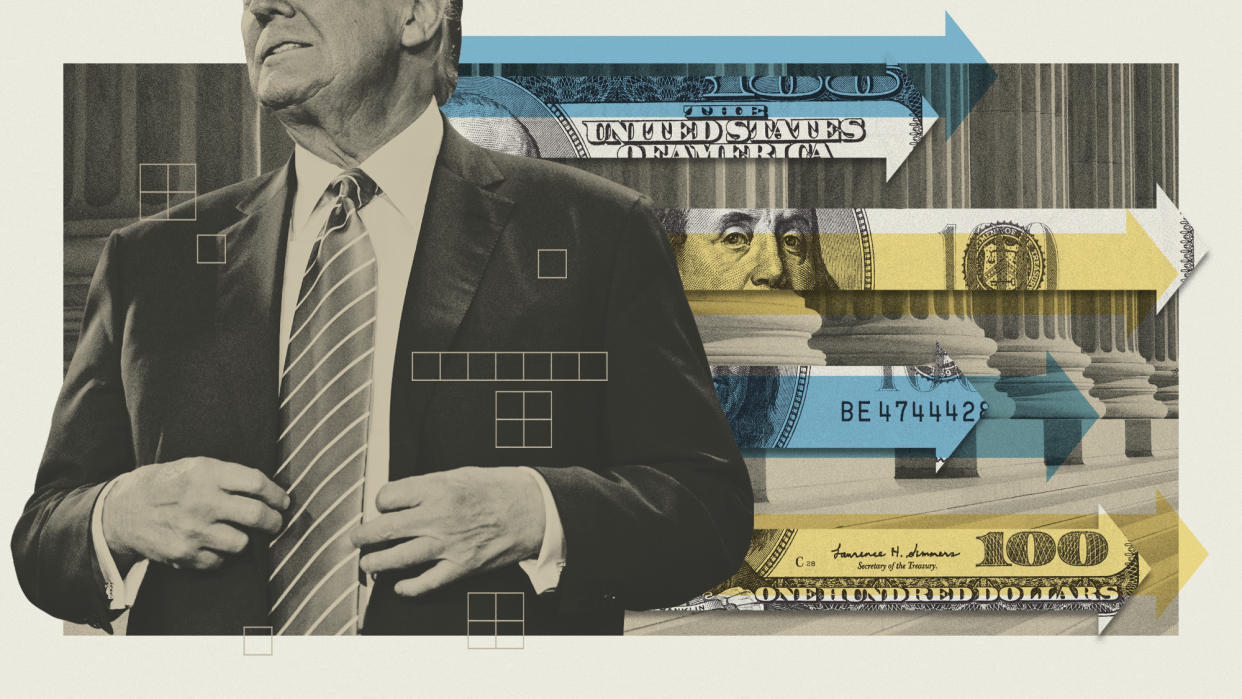Will Trump's cash flow dry up after his legal verdicts?

- Oops!Something went wrong.Please try again later.
- Oops!Something went wrong.Please try again later.
Experts disagree on the true net worth of former President Donald Trump, but whatever the figure is, it could end up changing drastically following a pair of legal battles. The former president was recently ordered to pay $83.3 million for defaming E. Jean Carroll after he was found liable for sexual abuse against her. This marks the largest financial hit to Trump since he left the White House.
And it's likely that the former president isn't done with the payouts either. A judge is expected to rule in the coming days in New York's civil case against Trump for financial fraud related to his businesses. Trump has already been found guilty of engaging in this fraud, and New York Attorney General Letitia James is asking the judge to impose a $370 million penalty against the former president. If the judge agrees with this figure — or imposes an even higher one — then the dual verdicts against Trump would cost him over $450 million.
What happens if this is the case? Forbes has reported that the former president has a net worth of $2.6 billion. However, the outlet estimates that he has just "$426 million in cash and liquid assets that would presumably be used for his court payments," part of an estimated $640 million in personal assets. Could Trump end up declaring bankruptcy like his former lawyer, Rudy Giuliani? Or will he find a way to fundraise around the issue?
What did the commentators say?
If the dual verdicts end up eliminating a large chunk of Trump's cash on hand, it would be a "potential blow to the presidential candidate whose persona is tied up with financial success and wealth," Erik Larson reported for Bloomberg. And if he does end up incurring total penalties in the nine-figure range, he wouldn't be able to use his campaign finances to pay these fines.
Trump can use campaign contributions to pay legal bills that "relate to his political duties or due to an investigation by Congress," Larson reported. But he can't use them for any personal damage expenses — such is the case in both of the trials in question. "There aren't any exceptions that would cover a damages award for a matter not involving him as a candidate or officeholder," former federal prosecutor Jennifer Rodgers told Bloomberg.
The "combination of the New York civil fraud case and the E. Jean Carroll cases could be a one-two punch that triggers a bankruptcy," Ciara Torres-Spelliscy, a law professor at Stetson University, told Newsweek. However, Tores-Spelliscy also noted that it is highly unlikely that Trump "would want to file for bankruptcy during an election year."
However, attorney Bradley Moss told Newsweek that Trump, unlike Giuliani, has tangible wealth to his name that could help him avoid bankruptcy even in the case of a large payout. "I do not expect this to bankrupt him," Moss said. "He isn't Rudy [Giuliani]. He does have actual assets."
One former confidante of Trump isn't so confident, though. Attorney Michael Cohen, a former lawyer of the president, noted that the financial penalty against Trump in the New York civil case could "go anywhere up to what the judge determines." Cohen told CNN last year that the damages against Trump will "exceed $600 million. Does that put the company [into] bankruptcy? He does not have that liquid cash."
"Many of the assets [Trump] owns, he has limited-to-no basis in them," Cohen said. This means that Trump will also have to pay tax on the money between the basis and the sale price of any assets he sells, Cohen added.
What next?
The judge in Trump's fraud case, Arthur Engoron, is expected to make his ruling sooner rather than later. Throughout the trial, Engoron "showed little patience for Trump’s courtroom antics" and "nixed Trump’s attempt to make a closing argument," The New Republic reported. At one point, he begged for Trump's lawyers to "control your client."
But the real "psychological waterboarding" for Trump would come if Engoron strips him of his ability to practice business in New York state, The New Republic noted — something that many legal analysts expect him to do. Trump also continues to face 91 felony indictments related to a long list of alleged crimes, including incitement of the Jan. 6, 2021, attack in Washington, D.C., and attempts to overturn the election in Georgia.

